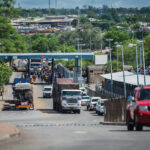What to do after a truck accident
What to do after a truck accident
September 17, 2021
Accidents are always stressful, but it is important to manage the situation effectively to ensure the best outcome for you and any other parties who may be involved. First and foremost: prevention is key. Make sure your truck is safe to drive using this pre-trip inspection list. These risks can also be easily avoided: speeding, not wearing a seatbelt, the use of cellphones, and driving under the influence of alcohol. When an accident does occur, however, these guidelines can help to get you through this unpleasant event:
- Immediately after the accident
- Stop, stay calm and make sure the scene is safe. Switch off the engine and turn on your hazard lights.
- Call emergency services and don’t leave the scene until police arrive.
- Give your statement to the police. Do not make accusations and don’t accept liability.
- Contact your insurer’s roadside assist line if your vehicle is not driveable
The importance of contacting your insurer’s roadside assist line includes:
- Specialist recovery of the truck and goods in transit.
- Towing to the nearest, reputable repairer.
- They will manage the clean-up of hazardous waste, should there be any.
- You may be liable for towing and storage costs if you use other towing operators.
- Make notes of important details
It can be difficult to think clearly in these situations.
This Post Accident Guide can be kept in your truck to help you collect crucial information. - Take photos and retrieve telematics media
- Capture the vehicles’ positions, collision points and any skid marks.
- Remove telematic camera’s memory card/s.
- Report the accident to the police, within 24 hours or the next working day.
- Minor damage accidents can be reported here.
This includes accidents where: - No one has been injured or killed.
- Four or fewer vehicles have been involved
- Crashes that include a person(s) being injured or killed must immediately be reported to the nearest municipal/metro police, traffic department office or SAPS station.
- Notify your insurance adviser
- Supply full details, as the incident might result in a claim later.
- Any approach or correspondence from the third party must be forwarded to your insurance adviser.
Focus on Transport
September 17, 2021
0
Published by
Focus on Transport
FOCUS on Transport and Logistics is the oldest and most respected transport and logistics publication in southern Africa.
focusmagsa

Charmont Media Global • Copyright © 2024 • Privacy Policy



